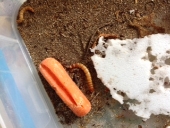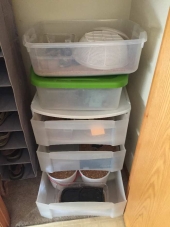




















List of Bryant RedHawk's Epic Soil Series Threads We love visitors, that's why we live in a secluded cabin deep in the woods. "Buzzard's Roost (Asnikiye Heca) Farm." Promoting permaculture to save our planet.




Bryant RedHawk wrote:Meal worms will not pupate when in groups, they tend to keep in the larval stage and then die off as they age too long in larval stage.
Temp looks pretty good as does humidity, so I'm thinking they weren't separated so they would pupate.
It's a rather strange ecology for a larval organism but in laboratories, where they are used for class work, the larvae are kept together no more than 1 month then they are separated into small groups in large containers so they will pupate.
Redhawk




Bryant RedHawk wrote:Meal worms will not pupate when in groups, they tend to keep in the larval stage and then die off as they age too long in larval stage.
Temp looks pretty good as does humidity, so I'm thinking they weren't separated so they would pupate.
It's a rather strange ecology for a larval organism but in laboratories, where they are used for class work, the larvae are kept together no more than 1 month then they are separated into small groups in large containers so they will pupate.
Redhawk




A build too cool to miss:Mike's GreenhouseA great example:Joseph's Garden
All the soil info you'll ever need:
Redhawk's excellent soil-building series





























List of Bryant RedHawk's Epic Soil Series Threads We love visitors, that's why we live in a secluded cabin deep in the woods. "Buzzard's Roost (Asnikiye Heca) Farm." Promoting permaculture to save our planet.
















Forever oscillating between wondering how I can fit everything I want to grow into my tiny urban garden (hahaha I can’t) and how to make enough money to buy my dream mini farm where I can grow everything I want to grow, raise chickens and be a haven for my local pollinators and wildflower species 😁🌱🌻

|
keep an eye out for scorpions and black widows. But the tiny ads are safe.
permaculture thorns, A Book About Trying to Build Permaculture Community - draft eBook
https://permies.com/wiki/123760/permaculture-thorns-Book-Build-Permaculture
|



